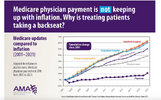I spoke to a PhD fraternity brother of my just last month. PhD chemist from University of Wisconsin. Works for LabCorp after several post docs and has been there for 5 years. Makes 120k. He was accepted to multiple medical schools that were much higher ranked than where I was accepted (I think UVA was his best, EVMS/University of SC were my acceptances).
I'm a lowly family doctor making a little over 3X what he is.
I have a cousin, PhD biocehmist from Duke working for Pharma. She does pretty well (not sure the actual number), but based on what little I know there's no way she's making what I am unless she's saving/investing 50% or more of her income.
Yes, PhDs can do very well. But on average they make a good bit less than MDs do. Unless you really try, you'll end up 300k+ as a physician. Most PhDs don't make that.
That all sounds about right. Chem/bio/biochem are all weak links in the STEM world. I also wouldn't put either Duke or UWis in the elite bucket in those fields, especially UWis. More importantly they are far from the real action in SF, SD, Boston, Seattle, etc... I'm thinking more along the lines of top 10 or maybe top 20 for fields like BME. I think almost any med student could reasonably have gained admission to these programs if they had redirected pre-med efforts to PhD. Duke's BME PhD (an elite program) averages a 3.6 and ~85%ile GRE. UVA med averages a 3.87 and 95-96%ile MCAT.
Your fraternity brother sounds like he made some odd career choices. Combine that with multiple post-docs and a job at LabCorp and something is off or he's just content with a low stress job. PhD is usually dramatically less competitive than MD except at the very, very top so the admissions there is not the norm.
Depending on where your cousin works she might be making/saving more than you think (especially if she's receiving significant compensation in equity, which people tend to save rather than spend). Pharma also is a bit more "choose your own destiny" than medicine. Lower floor. Higher ceiling.
But... you are right in that a lot of these people are very smart, work very hard, contribute very much to our society, and still get paid garbage. This is generally true of anyone who is dead set on actually
practicing their craft rather than consulting or managing.
Are we talking about lifestyle or are we talking about wealth here?
The fact of the matter is most engineers start making 60-75k after graduation... That kind of money give you no real purchasing power and very little room to save/invest.
People exchange lifestyle for wealth. They're inseparable.
Much closer to $75K, and med students always forget there are bonuses and benefits (like retirement match) that boost TC. Senior BME undergrads from my lab are all talking about salaries in the $70K range and additional bonuses/benefits bringing compensation closer to $90-100K. I worked in engineering for 2 years before med school. If you apply a med student's work ethic to engineering you will soar through the bottom ranks and into the $125-140K range by 25 years old. From there you either transition to management, move to a much larger/flashier company for a raise, transition to another sector like consulting, or simply enjoy 40 hour weeks with a solid salary/bonus.
True, but living in places like Boston is a choice. Physicians could easily have a much better life by moving 3 hours up to Portland or even Manchester. Again, not saying there’s anything wrong with wanting to living in cities but it’s not like they couldn’t have a much better life elsewhere
This is true and a good point.
My partner is in biotech and it's looking like SF, SD, Boston, Seattle, or LA is an inevitability. Opportunities elsewhere are very mediocre in comparison from a career mobility/intellectual fulfilment perspective. However, my imaginary scenario doesn't apply because we'd have two incomes. Even if I could only contribute $90K, they'd be chipping in another $100-200K. If I were the sole earner, we'd be in Portland unless I were dead set on academic medicine at HMS or something, which is ultimately another choice.




